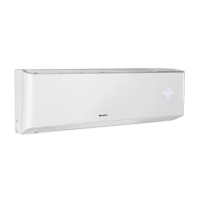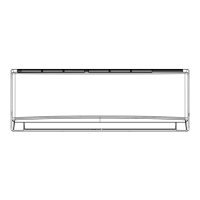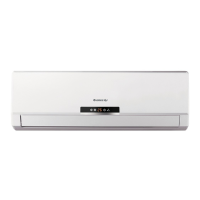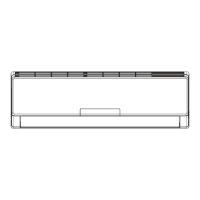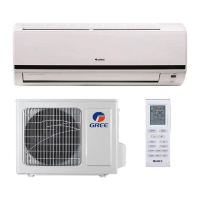73
Installation and Maintenance
Service Manual
(1) After tightening the screw, pull the power cord slightly to
check if it is rm.
(2) Never cut the power connection wire to prolong or shorten the
distance.
Note:
can't raise
upwards.
5. Connect Outdoor Electric Wire
(1) Remove the wire clip; connect the power connection wire and
signal control wire (only for cooling and heating unit) to the wiring
terminal according to the color; x them with screws.(As show in
Fig.23)
6. Neaten the Pipes
(1) The pipes should be placed along the wall, bent reasonably
and hidden possibly. Min. semidiameter of bending the pipe is
10cm.
(2) If the outdoor unit is higher than the wall hole, you must set
a U-shaped curve in the pipe before pipe goes into the room,
in order to prevent rain from getting into the room.(As show in
Fig.24)
(2) Fix the power connection wire and signal control wire with
wire clip (only for cooling and heating unit).
Fig.23
Fig.24
Fig.25
yellow-
green
N(1)
09K / 12K / 18K / 24K GWH18YE-S6DBA2A/O
POWER
2
(black)
L(3)
brown
LN
Indoor unit connection
blue
black
brown
blue
yellow-
green
LN
Indoor unit connection
LN
POWER
N(1) 23
blue
brown
brown
(black)
blue
yellow-
green
black
yellow-
green
Note: The wiring board is for reference only, please refer to the
actual one.
wal
U-shaped curve
drain hose
(1) The through-wall height of drain hose shouldnt be higher
than the outlet pipe hole of indoor unit.(As show in Fig.25)
(2) The water outlet can't be placed in water in order to drain
smoothly.(As show in Fig.26)
(3) Slant the drain hose slightly downwards. The drain hose can't
be curved, raised and uctuant, etc.(As show in Fig.27)
Note:
Liquid valve
Gas valve
Refrigerant charging
vent
Nut of refrigerant
Charging vent
Vacuum pump
Piezometer
Valve cap
Lo Hi
Inner hexagon
spanner
Open
Close
The drain hose can't be fluctuant
The drain hose
can't be fluctuant
The water
outlet can't be
fluctuant
The water outlet
can't be placed
in water
1. Use Vacuum Pump
(1) Remove the valve caps on the liquid valve and gas valve and
the nut of refrigerant charging vent.
(2) Connect the charging hose of piezometer to the refrigerant
charging vent of gas valve and then connect the other charging
hose to the vacuum pump.
(3) Open the piezometer completely and operate for 10-15min to
check if the pressure of piezometer remains in -0.1MPa.
(4) Close the vacuum pump and maintain this status for 1-2min
to check if the pressure of piezometer remains in -0.1MPa. If the
pressure decreases, there may be leakage.
(5) Remove the piezometer, open the valve core of liquid valve
and gas valve completely with inner hexagon spanner.
(6) Tighten the screw caps of valves and refrigerant charging
vent.(As show in Fig.28)
(7) Reinstall the handle.
8.7 Vacuum Pumping and Leak Detection
Fig.27
Fig.26
Fig.28
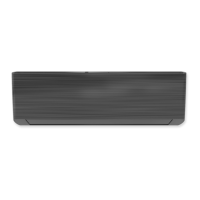
